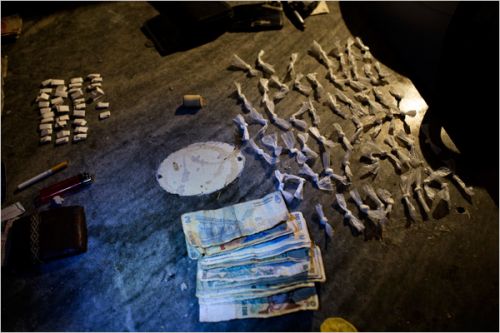The rise of 'paco' in Buenos Aires
 Not that we particularly need gruesome reminders of how bad drug addictions can get, but I found this NYTimes article on the rise of "paco" to be a good reminder. "Paco" might ordinarily simply refer to "cocaine paste," at least according to Wikipedia, but in this case, the "paco" in question is a far deadlier concoction on the rise among the poorest neighborhoods in Buenos Aires:
For more than five years Mr. Eche has been a slave to paco, a smokable drug made from bits of cocaine residue mixed with industrial solvents and kerosene or rat poison. Labeled “the scourge of the poor” by politicians, the drug has become the greatest social challenge facing shantytowns like Oculta....
Paco began arriving in 2003 as a cheaper alternative to snortable cocaine once Argentina became a destination for the final processing of cocaine flowing in from Bolivia and Peru. The growing supplies of leftover cocaine residue made creating paco fast and cheap. It sells on the street for as little as $1.30 a dose....
Paco averages only 10 percent cocaine, with the rest being highly toxic substances, the judge said. “Doctors we have consulted say nerve cells and brain cells start dying soon after consumption begins,” he said.
Paco also wreaks havoc on the appetites of users, who literally die from not eating, Judge Torres said. The drug is so new there is no clear treatment protocol to break the addiction, he said.
The police have hid little luck stopping its spread, despite a round of recent raids targeting the low level mom-and-pop dealers who are much more often responsible for creating supply than organized operations. As long as conditions remain this ripe, law enforcement seems futile:
Beyond the police raids, Mrs. Acuna said, politicians need to get to the root of what is causing paco’s spread. Oculta’s residents are starving for jobs with decent salaries to help break the cycle of hopelessness that is creating whole families of paco addicts and dealers, she said.
She and her husband said they hoped to find the money to turn the upper floor of their diner into an integrated drug-prevention center employing psychologists and professional counselors.
Ultimately, only Oculta can save itself, Mrs. Acuna said.
“This is really up to us.”
|

Recently @ DoseNation
|
|






















The comments posted here do not reflect the views of the owners of this site.